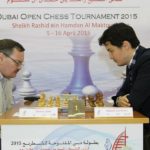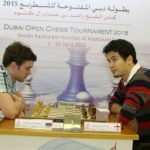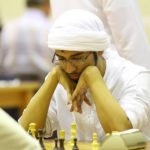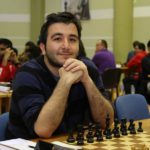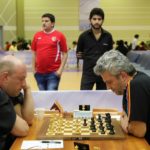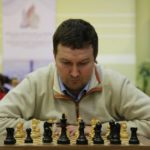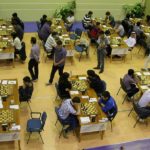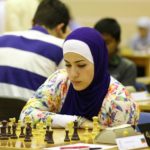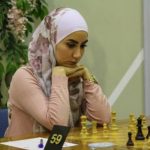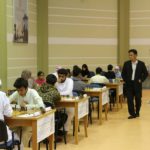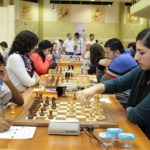The 17th Dubai Open Chess Tournament took place from 5th – 16th April 2015 at the Dubai Chess and Culture Club, with players from at least 43 countries competing for the prestigious Sheikh Rashid Bin Hamdan Al Maktoum Cup – nine rounds Swiss, time controls: 90 min + 30 sec per move start from move one. The total prize sum was US $50,000, with the winner receiving $12,000. Cash prizes were awarded to the top 18 placers, with additional prizes for local and Arab players and for the top women scorers.
I missed the tournament last year, but I had some good results in the past. The tournament usually attracts the same players. Usually only few players from Western Europe. Dubai itself is very well known tourist destination. The chess in UAE is well respected and they have wonderful facilities to accommodate the players needs and they hired coaches from other countries. Recently GM Ivan Sokolov became the newest coach focusing on the talented local player Salem, A.R. Saleh. I did not have a big expectations for this tournament, I play too rarely and to get into form requires more participation in tournaments. Still I started strong with two wins, but then lost to tournament favorite David Howell from England. I had a good position, but when my opponent had only 30 seconds per move I could not make good use of it and finally I blundered. My friend Alex Shabalov had a wonderful tournament till last round, but lost to Ivan Ivanisevic missing the winners by half a point. I drew my last round game against South American GM Iturrizaga and finished with 6 points. The full standing may found here.
The tournament got into big news because of the cheating. Georgian chess champion Gaioz Nigalidze has been kicked out and banned from the Dubai Open Chess Tournament after he was caught cheating. He got help from a chess app running on an iPod touch. His opponent, Armenian grandmaster Tigran Petrosian, grew suspicious as Nigalidze literally ran to the toilet nearly after every move and it was later discovered he visited the same cubicle. When the tournament officials eventually inspected the cubicle they found the device hidden behind the bowl and wrapped in toilet paper, along with a pair of headphones. Nigalidze denied it was his, but upon further inspection, authorities found that its social media apps were logged into the Georgian champ’s accounts. They also found his board mirrored on an open chess app. He was immediately forfeited from this game and also from the tournament. It’s unclear if Nigalidze has done this before, and if he did, to what extent. He won in last December a strong tournament in Al-Ain and he is two times Georgian champion. Nevertheless, his whole career is now under scrutiny. He isn’t the first and the only person to cheat on a chess tournament with the aid of a high-tech device. In 2002, an American player tried to pull off something similar, checking out simulations in the bathroom in the middle of a match. Indian player Umakant Sharma was caught cheating in 2006 by communicating with accomplices through a tiny Bluetooth headpiece hidden inside a cloth cap. And then in 2008, the Dubai Chess Club banned an Iranian player after it was discovered that a partner was sending him moves through text messages while watching a live stream of the game.
Using outside help during the game is a big problem, because if you have accomplish who goes to the toilet it is hard to get any evidence of cheating. World Championship challenger Topalov was under suspicion of fellow grandmasters, but there was never any proof. In other hand Topalov was accusing Kramnik in the famous toilet scandal, more details about it here.
Everybody is under suspicion and there is always possibility to cheat. We hope that our chess hero is not going to end like Lance Armstrong. The good news is that the regular price fund is not big enough to induce cheating, but you need to be aware.
Jaan Ehlvest
